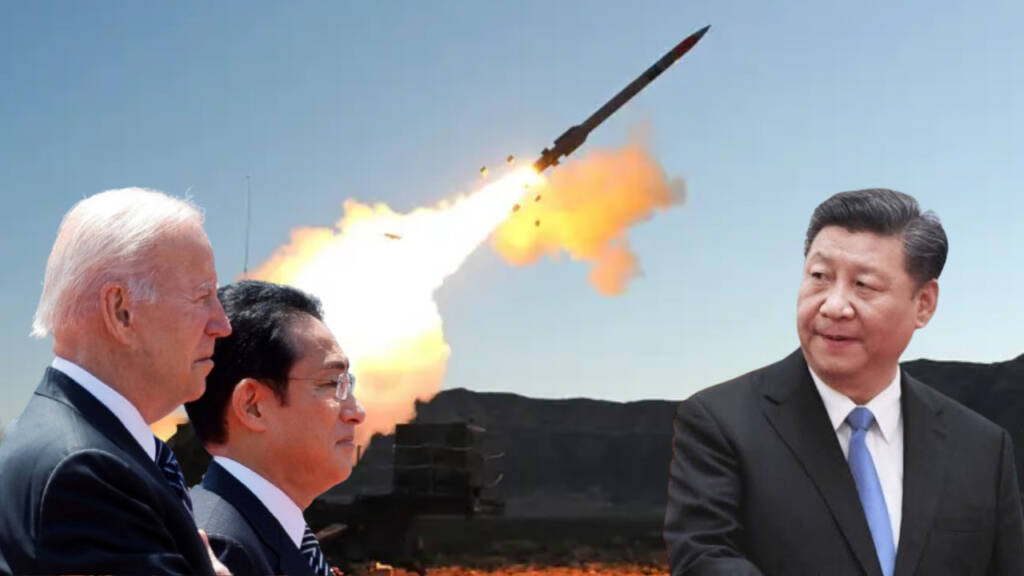The Ukraine war has gobbled up a lot of the weapons the US usually keeps stocked up. This led to a shortage back home. So, what’s Uncle Sam doing now? Well, it’s not knocking on Russia’s, India’s, or China’s door, for sure—those friendships are a no-go zone. The only pal left on the list? Japan. Yep, the US is turning to Japan, maybe because there aren’t many other choices left in the friendship department.
Running low on their war toy stash, the US is hitting up Japan for help. And guess what? Japan’s stepping up to the plate, ready to export weapons for the first time since World War II. Yep, times are changing, and Japan’s getting into the game.
Join us on Telegram: https://t.me/tfiglobal
As per a report from RT.com, Japan has given the green light to supply Patriot missiles to the US, ending a ban on military exports dating back to the country’s pacifist constitution in 1947. This move aims to bolster the depleted stockpiles of the US, affected by the ongoing Ukraine conflict.
Read More: Taiwan can wait! China might be planning to invade Japan’s Senkaku islands first
The confirmed arms sale to the US, disclosed in Tokyo on Friday, marks Japan’s first export of lethal weaponry since World War II. Mitsubishi Heavy Industries in Japan produces Patriot missiles under a license from US defense giants Lockheed Martin and RTX.
The report even suggests that these Japanese-made interceptor missiles could enable the US to provide more US-made Patriots to Ukraine. Prime Minister Fumio Kishida emphasized that this action aims to safeguard a free and law-based international order while promoting peace and stability in the Indo-Pacific region. The Foreign Ministry highlighted that this missile deal would further strengthen the Japan-US alliance.
Though Kishida affirmed that Japan remains committed to its pacifist stance, US Ambassador Rahm Emanuel acknowledged Japan’s exceptional strides in security reforms, describing the defense modernization in Tokyo as unprecedented.
The decision to allow exports coincided with Japan’s Cabinet approving a 16% increase in defense spending, reaching a record high for the fiscal 2024 military budget of 7.95 trillion yen ($55.8 billion). This budget requires approval from Japan’s parliament.
Kishida, in December 2022, announced a five-year military expansion plan that could position Japan as the world’s third-largest defense spender, trailing only the US and China. Such substantial defense investments were once deemed improbable under Japan’s constitution, crafted by the US, relinquishing Japan’s right not just to engage in warfare but also to possess weapons beyond those necessary for minimal self-defense.
This lifting of Japan’s export prohibition may pave the way for the potential sale of F-15 fighter jets and other armaments produced by Japanese firms under US licenses to be marketed to Washington, the UK, and other Western allies.
As Japan potentially moves away from its long-standing pacifist stance established in 1947, it’s crucial to pay attention to the persisting tension surrounding the Senkaku Islands.
This territorial dispute between Japan and China has remained a contentious issue, and any shift in Japan’s approach might have significant implications, particularly concerning possible military actions related to the Senkaku Islands. If Japan continues its departure from its historical pacifism, it could potentially reconsider its strategies regarding these disputed islands, possibly leading to heightened tensions or even military confrontations with China over territorial claims. This shift in Japan’s military posture could fundamentally alter the dynamics of the longstanding dispute and regional stability in East Asia.
If the US is the one requesting weapons of war and nudging Japan to step away from its peaceful ways, it logically follows that the US can’t exactly turn the tables and tell Japan to hold off from using those weapons in the Senkaku Islands. I mean, they’re the ones who gave Japan the green light in the first place. This situation could boomerang on the US, creating a tricky scenario where they might find it challenging to dictate or regulate Japan’s use of these weapons, particularly in the Senkaku Islands dispute.
Recommended Video:
